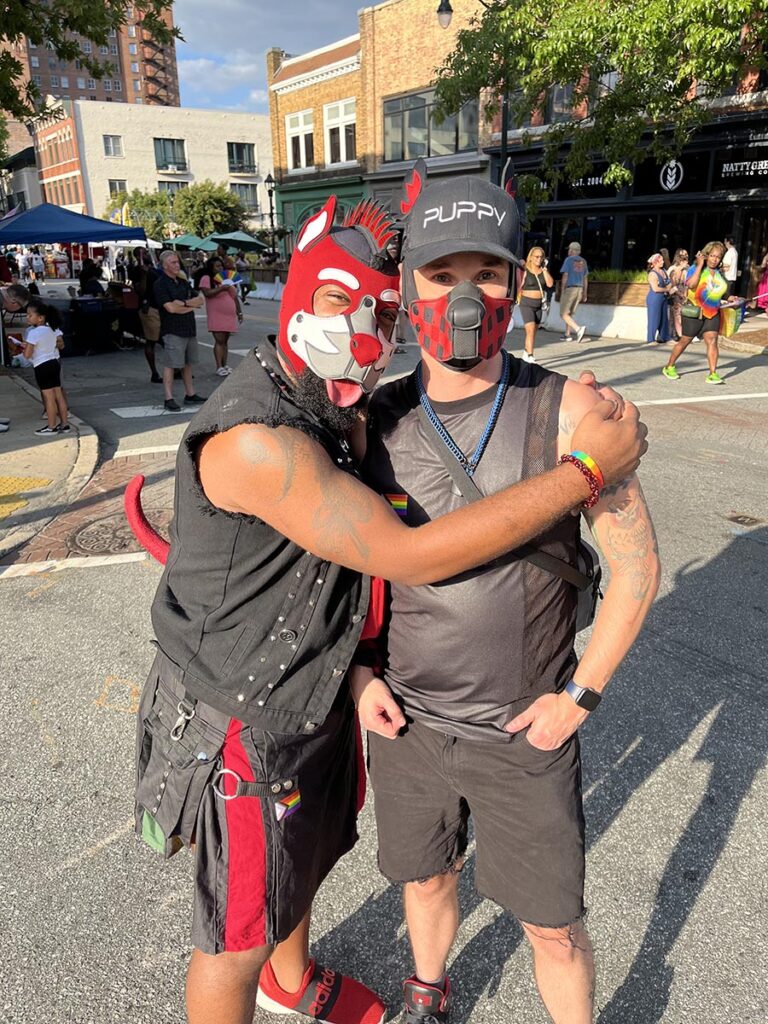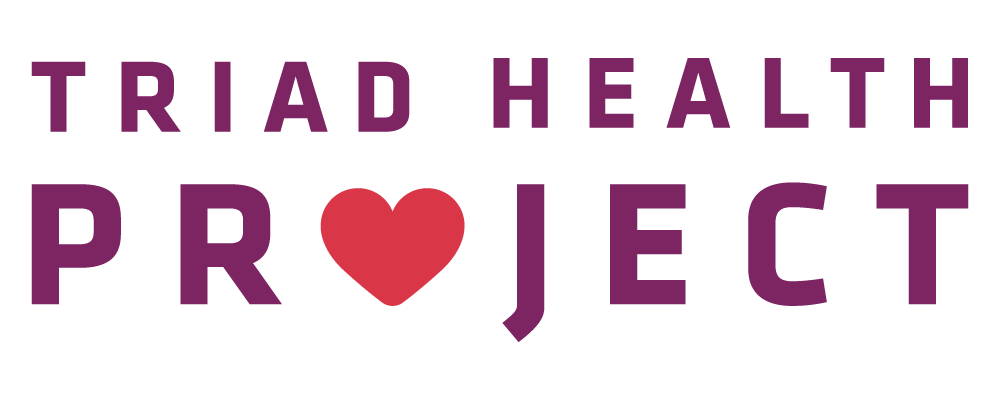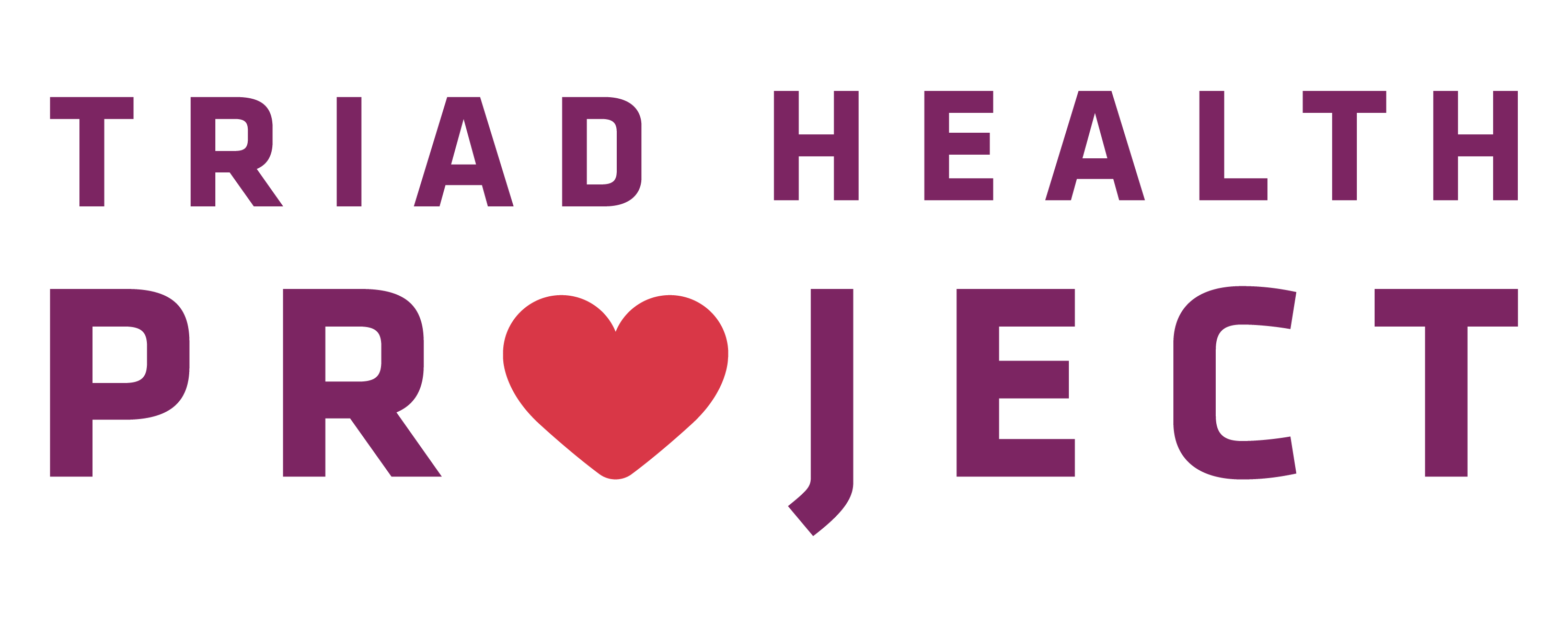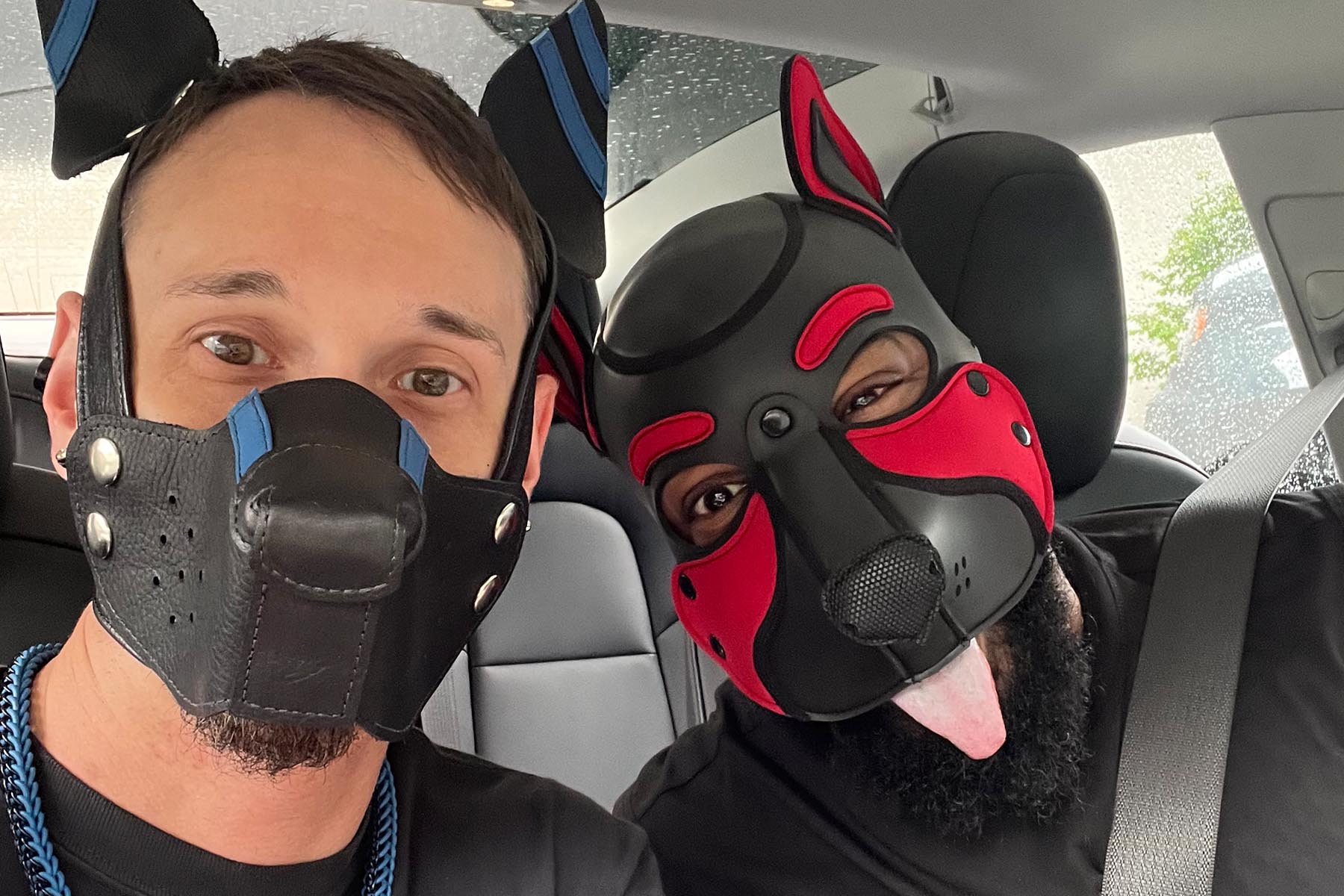One Couple Unleashes Their Kink to Stop Sexual Health STIgma
These pups help put the unique and popular kink into perspective by celebrating community and connection.

Pup play has become an incredibly popular form of kink in recent years – largely due to not only the intrigue that comes from its specialist gear, but also the often highly supportive and open minded communities that engage with it.
Pup play is exactly how it sounds – an individual chooses to behave like a dog, moving around on all fours, communicating through woofs and yips, and largely leaving their more human side behind. Although identified as a kink, replete with pup hoods – masks in the shape of animalistic faces, and often even tails – the community is quick to address the fact that not all of the behavior involved in pup play is sexual in nature.
A big reason for the appeal of pup play, it would seem, is its low barrier of entry. Pup hoods, leashes, collars and equipment are largely inexpensive – in fact, the only real cost of entry is to forget your inhibitions and human worries. In a world like the one we share today, is it any wonder that pup play has soared in popularity?
What is the first thing you thought of when you first heard the word ‘kink’? What about when you think of the word now?
At first glance, pup play seems like a sexual roleplay kink in a similar flavor to any other, yet diving a little deeper reveals that is not fully the case. So much of what is to be learned through campaigns such as Stop the Stigma is simply a case of understanding the people involved. Looking to help build a basis of understanding around the pup play lifestyle, Triad Health Project spoke with Chance and Spike to help put this unique and popular kink into perspective.
Chance: My first thought was that it was all about promiscuous people who were into some odd things. After being exposed to people in the kink community, I realized that it was really people who come together to enjoy exploring their likes and desires – which aren’t always sexual.
Spike: I used to always assume sex too, but now I see it as more of an expression of one’s true self, or dream self. Something that you want to release, but on some level, society won’t let you. Many times, that makes it an escape!
Can you share more about your interests in kink today? What do you find fulfilling about fetish gear and play?
Chance: For the most part my biggest kink is pup play. I enjoy the headspace aspect the most. It’s so great to go have a carefree night out as a pup, leaving my human problems and life to the side for the while.
Spike: I discover more about myself the more I give myself the freedom to “pup out”. My husband jumped in first, and I went along for the ride – but not as a pup at first. I started seeing the social side of pup play, the familial side of it, and that’s when I joined in – but of course, I also found myself intrigued by the gear!
Chance: The gear definitely helps. The pup hood would definitely be the biggest help for getting into that headspace. My tail is another item I favor – I love shaking it at bars.
Spike: As I’ve spent more time in the community, I’ve discovered a greater interest in other play – ropes, impact, and sensual massage, to name a few. I find it quite freeing when in my pup headspace. My day job can be quite challenging, and when I can pup out and leave that world behind for a few hours, it’s one of the greatest feelings!
How did you and your partner start conversations about this or any type of kink or fetish play? How did you address challenges in the discussions?
Spike: Luckily we found the community together, so there weren’t any difficult discussions. My partner and I first encountered pups at Charlotte Pride in 2019. We saw a group of pups, asked them about pup play, and I bought him his first hood for his birthday.
Chance: I appreciated that, for my birthday a couple months later, my husband surprised me with my first pup hood. After the first wear, I knew I enjoyed it. We attended our first event together and loved the pup community. After a few events, my husband decided to give pup play a try too.
How would you describe the impact of stigma on that conversation? On your own experience as an adult with responsibilities?
Spike: I’ve noticed that there has been a lot of emphasis, mostly from people outside of the kink community, on only seeing the sexual side of kink.
Chance: Honestly, neither my husband or I knew what we were getting into, but were willing to try something new. We are usually pretty honest and open with those conversations.
Spike: Just as there have been in the ballroom and drag communities, there is a lot of community and chosen family involved in the pup play kink scene. Finding your tribe is a huge part of all three of those aforementioned communities, ours included – it’s all about finding those people who can accept you for who you are, but also aren’t afraid to correct and guide you if you are in the wrong.
Chance: Even so, I have chosen to keep my pup life away from some people in my life, however, because I don’t feel like they would be open to new ideas and different lifestyles.
Spike: Many people don’t see what goes on in the play areas – dungeons, pet play areas, bedrooms and so on. They have a certain “scene” in their heads, and that is all they can obsess over. But they don’t see the part of kink groups giving back to the communities. There’s toy drives for kids, fundraisers for local health organizations, working to make sure the community has access to testing for their sexual health, and standing up for the rights of people in the community, including LGBTQ people.
In what ways can stigma around sexual health (and kink and fetish play) impact the lives of people? How does it impact our community’s health?
Chance: When people hear the word kink they believe people are promiscuous, but that isn’t always the case. A lot of being in the kink is having a bond and trusting in the people you have interactions with.
Spike: In fact, the kink community is probably one of the safest groups of people. Consent is a HUGE part of this community.
Chance: Plus, not all interactions are sexual.
Spike: Exactly. For a lot of scenes, there’s actually no sex involved. A lot of kinksters have learned to be sensual without the use of penetrative sex. I don’t think people on the outside see how well we take care of our mental health either. The community always rallies around if anyone is in need.
Do you think the stigma has changed over the years?
Spike: I believe so – slowly. There’s a more public lens on kink now. The safe spaces to explore them are much more public than they used to be.
Chance: We still get odd looks from some people when out in our gear, but at the same time there are more curious people who ask valid questions now.
Spike: But there are still plenty of people, even queer people, who don’t see anything beyond the sexual label they’ve given to kink groups. I believe there’s been a much bigger step forward with sexual health in this regard, however. The queer community, as a generalized whole, has always been more sex positive.
What are suggestions you have for people to step up in their lives to stop the stigma around sexual health?
Chance: My suggestion is to live life and try new things. You’ll never know how much you will enjoy new things until you try. Don’t let what other people think about you stop you from being happy.
Spike: But also, speak up! If you hear misinformation about something, speak up. Correct them, but always start from a place of love. The same applies if you don’t like what is happening if you try this kink, or any kink, for yourself.
Would you like to share any other thoughts?
Chance: My favorite part of pup play is the community. Over the past three years we have met so many great pups. It’s great to go out of town and know you can hang out with other pups and have a great time. Since trying pup play, it has also made me more willing to try other kinks.
Spike: Safety is always a priority though. Get tested, and always take care of yourself both physically AND mentally. Keep boundaries in mind too! Stay out of the business of those who are enjoying themselves. If you don’t like something that someone else is doing, and they seem happy, but it doesn’t affect you, leave it be! Peace, love and BARK!
Learn more about Triad Health Project’s #StopTheStigma initiative as we continue our mission to see a future free of HIV.
Want to show your support for our work ending HIV and supporting sexual health? Start here.


